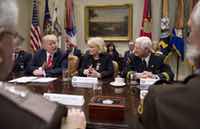Updated with comments from Sheriff Eavenson and reporting from Austin.
WASHINGTON — There’s a Texas state senator with a new target on his back, courtesy of President Donald Trump and the Rockwall County sheriff.
At a meeting Tuesday with sheriffs from around the country, Sheriff Harold Eavenson complained about a state senator who wanted to make it harder for law enforcement to get control of assets forfeited by drug traffickers.
The sheriff shrugged and declined to offer a name during a meeting in the Roosevelt Room at the White House, where Trump met with about a dozen sheriffs. Reached later by cellphone, Eavenson again declined to identify the lawmaker. He said he didn’t take the president’s offer to destroy the senator literally.
“He was just being emphatic that he did not agree with that senator’s position,” Eavenson said, adding of the senator in question, “I’m not into assassinating his character.”
Eavenson will become president of the National Sheriff’s Association in June. He has been active in the Sheriff’s Association of Texas.
Sheriff tells Trump that state senator is doing something he doesn’t like
Trump: “Do you want to give his name? We’ll destroy his career.” pic.twitter.com/75y3t9zc54
— Steve Kopack (@SteveKopack) February 7, 2017
The object of ire big enough to mention to the president wasn’t immediately clear. Eavenson referred to “him” several times and confirmed that it’s a male senator. Speculation quickly swirled in Austin.

During the meeting, Trump went around the room asking the sheriffs to air top concerns.
“There’s a state senator in Texas that was talking about legislation to require conviction before we could receive that forfeiture money,” Eavenson told the president.
“Do you believe that?” Trump said.
“And I told him that the cartel would build a monument to him in Mexico if he could get that legislation passed,” Eavenson said.
“Who is that state senator? I want to hear his name. We’ll destroy his career,” Trump said, prompting laughter.
Two Texas senators have offered legislation this year to require conviction before someone’s assets could be seized. Sen. Konni Burton, a Republican who often pushes civil-liberties legislation to protect personal information and property, was a fierce critic of Trump during the campaign. She and Sen. Juan “Chuy” Hinojosa, a McAllen Democrat, have formed an unlikely team pushing this asset forfeiture legislation.
Hinojosa said he didn’t believe he was the target of Eavenson’s comments. But he said he wasn’t concerned about Trump’s promise to wreak havoc on a senator’s career.
“I don’t know the sheriff,” Hinojosa said. “Quite frankly, I don’t pay much attention to what Trump says anymore.”
Several other senators have also supported this change in the past, including two civil-libertarian Republicans: Bob Hall, whose district includes Rockwall County, and Don Huffines of Dallas. Aides to Burton, Hall and Huffines could not immediately be reached for comment.
Eavenson said he appreciated Trump’s sentiment.
“He was making a point about how much he opposed that kind of philosophy,” the sheriff said. “I appreciated what the president said. I can assure you that he is on our side.”
The conversation focused on border security and immigration, mental health and the jail population, and asset forfeiture.
The latter topic was the one discussed by Eavenson, a sheriff for 16 years. He’s concerned about state legislation that would make it harder to seize assets involved in the drug trade, and said the state senator pushing in that direction is misinformed.
“Some people sold him a bill of goods about the fact that just regular citizens are getting stopped, getting their money seized. I’m not saying that has never happened but I promise you it is in the minuscule minority,” the sheriff said, adding that there are state and federal procedures in place to protect the innocent. “It doesn’t take long to connect the dots when you make a score and then maybe a dog gets on their car, and that money’s been around dope.”
The president also vowed during the meeting to stop terrorism and to push hard in courts to reinstate executive orders blocking refugees and halting entry from seven Muslim countries.
“They want to take a lot of our powers away. Some people with the wrong intentions,” he said, reiterating his vow to secure the border to keep out drugs and immigrants. “We’re committed to securing our borders….We’re going to be building a wall.”
Before the president arrived, Trump adviser Kellyanne Conway chatted with Eavenson and Sheriff Carolyn Welsh of Chester County, Pa. — the only female sheriff on hand and treasurer of the National Sheriff’s Association.
Conway — a regular on cable news programs throughout the campaign, the transition and the new administration — chatted with Sheriff Richard Stanek of Hennepin County, Minn. The sheriff seemed unclear who she was.
“What’s your first name?” he asked. “Kellyanne,” she replied.
Once he arrived, Trump used the platform — and the assembled media — to continue his media-bashing crusade, announcing that in his view, sheriffs don’t get the news coverage they deserve.
“The sheriffs are good people,” he said.
As he went around the room seeking input from the sheriffs, Trump asserted that the country’s murder rate is the highest it’s been in 45 to 47 years — a debunked claim based on faulty math. Nationally, the annual murder rate jumped from 2014 to 2015 by the highest percentage since 1971, but the number of murders annually peaked in the early 1990s, and the per capita murder rate peaked in 1980.
Trump singled out Chicago, saying that the city is worse than some war-torn parts of the Middle East.
As for immigration, Trump said, “you’re not allowed to use the phrase silent majority anymore” but if that majority were to express its demands for a new immigration policy, “you would see a real protest.”
